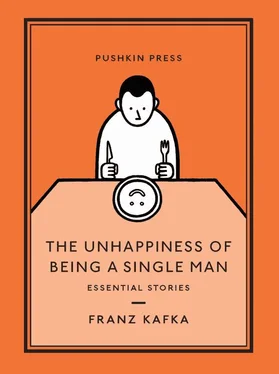It was then that I think I saw the king himself at one of the palace windows; he never usually comes to these outer buildings, he lives in the innermost of the palace gardens; but this time—at least this is what I thought I saw—he was standing at one of the windows and looking down, his head bowed, at the commotion in front of his palace.
“How’s this going to turn out?” we all ask each other. “How long will we need to endure these burdens and ordeals? The royal palace is what attracted the nomads, but it doesn’t know how to drive them away again. The gate stays locked; the guards, who used to have a ceremony of marching in and out, now stay behind barred windows. The job of saving the country has been left to us artisans and business people, but we aren’t up to it; we’ve never claimed to be capable of something like that. It’s a misunderstanding, and we’re all going to go under because of it.”
“IT’S A UNIQUE PIECE of equipment,” said the officer to the travelling researcher, looking over the familiar machinery with an air of admiration. The researcher seemed to have taken up the commandant’s invitation only out of politeness; he’d been asked whether he’d like to witness the execution of a soldier who’d been sentenced to death for disobeying and insulting a superior officer. Even in the penal colony there didn’t seem to be much interest in this execution. At least, there was no one else here with the officer and the researcher in this steep, sandy little valley enclosed by bare cliffs, apart from the condemned man himself, a stupid-looking, slack-jawed individual with scruffy hair and a dirty face, and a soldier who was holding a heavy chain attached to smaller chains that restrained the condemned man at his wrists, ankles and neck, and that were also connected to one another with an even smaller set of chains. The condemned man looked as submissive as a dog, as if they could have let him wander around the slopes on his own, and would have only needed to whistle for him when they wanted to start the execution.
The researcher wasn’t especially interested in this machine and paced up and down behind the condemned man, almost visibly indifferent, while the officer made the final preparations, first creeping under the machine’s foundations, which were dug deep into the earth, then climbing a ladder to inspect its uppermost parts. These jobs could have been left to a mechanic, but the officer performed them with great zeal, whether because he was a particular fan of the machine, or because there was some other reason why the work couldn’t be entrusted to anyone else. “All right, it’s all ready to go,” he finally called out, and climbed down off the ladder. He was very out of breath, with his mouth hanging open, and he’d stuffed two ladies’ handkerchiefs into the collar of his uniform.
“These uniforms are really too heavy for the tropics,” said the researcher, rather than asking about the machine as the officer had expected.
“True,” said the officer, washing his oily, grease-covered hands in a bucket of water, “but they’re a symbol of home; we don’t want to lose our connection to it. — Now have a look at this machine,” he added immediately, and dried his hands with a cloth while he pointed at it. “Up to this point, I’ve had to do some of the work by hand, but from now it’ll run automatically.” The researcher nodded and followed the officer, who tried to cover himself for all eventualities by saying: “Of course, problems can come up. I hope there won’t be any today, but you can never say for certain that they won’t. After all, the machine has to operate non-stop for twelve hours. But if problems do come up, they’re always very small things that you can easily fix.
“Wouldn’t you like to sit down?” he asked in the end, then reached into a jumble of wicker chairs, pulled one out and offered it to the researcher, who felt he couldn’t say no. He found himself sitting at the edge of a pit and threw a quick glance into it. The pit wasn’t very deep. On one side, the earth that had been dug out was banked up into a rough wall; on the other side stood the machine. “I don’t know,” said the officer, “whether the commandant has already explained the machine to you?” The researcher made an ambiguous gesture; that was all the officer wanted, because now he could explain the machine himself. “This machine,” he said, taking hold of a crank handle and leaning on it, “was invented by our old commandant. I worked with him on the very first trials and was involved in everything until it was completed. But the credit for inventing it is all his. Have you heard much about our old commandant? No? Well, it’s not an exaggeration if I tell you that the whole way the colony is organized is his work. When he was on his deathbed, we, his friends, already knew that he’d made the colony’s structure so self-enclosed that his successor, even if he arrived with thousands of plans of his own, wouldn’t be able to change anything of the old man’s, at least not for many years. And our prediction has been borne out; the new commandant has had to recognize that fact. It’s a shame you never met the old commandant! — But,” the officer interrupted himself, “I’m rambling while the machine stands here waiting in front of us. It consists, as you can see, of three parts. The lower part is called the bed, the upper part is called the engraver and this part suspended in the middle is called the harrow.”
“The harrow?” asked the researcher. He hadn’t been listening closely; the sun was far too strong in this unshaded valley and he found it difficult to gather his thoughts. It made the officer seem more impressive for carrying on in his tight parade uniform, weighed down with epaulettes and strung with braid, eagerly explaining his work while still making small adjustments here and there with a screwdriver. The soldier on guard looked to be in a similar condition to the researcher. He’d wrapped the chain holding the condemned man around his wrists and was leaning on his rifle, letting his head slump down on his neck and paying no attention to anything. The researcher wasn’t surprised; the officer was speaking French and he was certain that neither the soldier nor the condemned man could understand what he was saying. So it was all the more striking that the condemned man was nevertheless trying hard to follow the officer’s explanation. With a kind of sleepy tenacity, he looked wherever the officer was pointing; when the researcher interrupted with a question, both he and the officer turned to look at him.
“Yes, the harrow,” said the officer. “It’s a fitting name. The needles are arranged like the spikes on a harrow and that’s how the whole thing operates, albeit just in one spot and with a much higher degree of sophistication. You’ll see what I mean in a moment. The condemned man is laid down here on the bed. — I want to describe the machine before I start the process. Then you’ll have a better sense of what’s going on. Also, one of the cogs in the engraver is badly worn; it screeches very loudly when it’s moving and you can hardly hear yourself think over the noise; unfortunately, it’s very difficult to get replacement parts out here. — So, this is the bed, as I was saying. It’s completely covered in a layer of cotton wool; you’ll soon see why that’s needed. The condemned man lies face down on this layer of cotton wool, naked of course; there are restraints for the hands, the feet and the neck—here, here and here—to keep him in place. Here, at the top end of the bed, where the man, as I mentioned, lies face down, there’s a block of felt that can be easily adjusted to slip into the man’s mouth. It’s there to stop him screaming or biting through his tongue. You see, the man has no choice but to take the block into his mouth, because otherwise his neck would be broken by the restraints.”
Читать дальше












